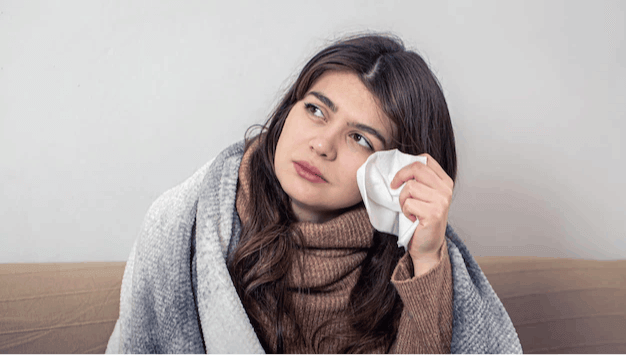Do you have these two kinds of people around you? One seldom catches a cold, as if headache and fever are not related to him; The other kind of people will catch a cold when they are ready to do so. They don't pay attention to keeping warm, or they go to crowded places to do activities without taking protective measures. They will get caught cold every season?
So, does it really mean that people who seldom catch a cold have stronger immunity?
What is immunity
Human immune function is mainly divided into two parts: innate immunity and acquired immunity.
★ Innate immunity
Congenital immunity refers to the function of the body to selectively reject and eliminate antigen substances entering the body. This is the natural protection ability gradually established by organisms in the process of germline development. People have innate immune function at birth.
The first barrier of innate immunity is skin and mucous membrane, which can prevent viruses and bacteria from entering the epithelial layer; The second barrier is macrophages, neutrophils, etc., which help the body play an immune response. These two barriers block the invasion of pathogens when the body is unaware.
★ Acquired immunity
Acquired immunity is the third barrier against viruses and bacteria. Acquired immunity, also known as acquired immunity or adaptive immunity, is the acquired defense ability established by the human body after birth. It refers to the anti infection ability acquired by human body through acquired infection or artificial vaccination (vaccine, vaccine, toxoid, immunoglobulin, etc.).
It is generally formed after being stimulated by antigens such as microorganisms (immunoglobulin, immune lymphocytes), and can react specifically with this antigen.

Cold and immunity
In life, many people will attribute the frequent colds, deep fatigue, and irritability to poor immune function. However, no research has shown that there is a direct relationship between colds and immunity. That is to say, if you often catch a cold, your immunity may not be very good, But if you don't catch a cold for a long time, it doesn't prove that your immunity is good.
Generally speaking, colds and fevers represent that the immune system is fiercely resisting invading pathogens. A certain degree of fever is conducive to improving the activity of phagocytes in the immune system and promoting antibody production, which is a self-protection mechanism of the body.
For example, children are easy to get sick. On average, children under the age of 6 will catch a cold 6 to 8 times a year. This is normal. As long as the cold is not serious, they can even heal themselves by simply sneezing and running nose. After that, their immunity will get better and better.
However, adults who often have colds and fevers cannot enhance their immunity, because their immune system has developed more comprehensively, and their immunity will only gradually decrease with age. Therefore, it is not possible to judge whether the human body's own immunity is good or not by whether they often have colds or not.

There are 4 aspects to whether the immune system is good or not
1、 Wounds are easy to be infected and not easy to recover
It is normal to have a wound on your body. Everyone gets hurt accidentally. But people with strong immunity can quickly stop bleeding and diminish inflammation, promote chronic wound recovery and skin repair, so as to avoid further deterioration of the wound. This is also due to immune cells.
If you are a person with low immunity, not only will the wound recover slowly, but also you are prone to suppuration, infection and other problems during the recovery process, and even the wound will deteriorate further.
2、 Take antibiotics frequently
People with low immunity usually need to use drugs to treat diseases rather than rely on self-healing ability because their bodies have poor ability to resist external pathogens. They also take antibiotics to kill bacteria and prevent inflammation.
However, although this can solve the immediate emergency, long-term use of antibiotics will also disturb the intestinal flora, or other side effects, which may lead to further decline in immunity.
3、 Angry and grumpy
People's life pressure has soared. Some people become more and more calm, while others become more and more hysterical and angry. Under the long-term negative and high-pressure mood, the level of cortex in the body increases, the level of immune cells in the blood decreases, and the human immune system becomes weaker and weaker.
Therefore, people who have been in a negative mood for a long time will be more likely to get sick if there are enough and strong immune cells to fight against the pathogen.
4、Poor sleep quality
Sleep is an important opportunity for the human body to rest and recover. During sleep, the body will release a lot of cytokines to fight against inflammation and infection and help wound healing. If you stay up late for a long time or have poor sleep quality and insufficient cytokines, it will give the disease a chance

How to improve immunity
1、Nutritional balance
The immune system is composed of antibodies, complements and various immune cells. Their growth requires the supply of various nutrients. Comprehensive and balanced nutrition intake is the basis for ensuring the normal operation of the immune system. Protein, fat, dietary fiber, vitamins, minerals and other nutritional elements should be included.
2、 Positive and optimistic
Anxiety, panic and other emotions will bring us psychological pressure, leading to a decline in resistance, and thus vulnerable to viruses. We should learn to cope with the pressure from time to time, be as optimistic and positive as possible, make friends, talk more, and participate in more parties.
3、 Get enough sleep
Studies have shown that when exposed to the virus, those who sleep less than 6 hours a week in a row are four times more likely to catch a cold than those who sleep more than 7 hours.
Adequate sleep can ensure that the energy and physical strength are full when waking up. Generally, adults sleep 7~8 hours a day, and the elderly can not sleep less than 6 hours.
4、 Moderate exercise
Relevant studies have pointed out that the number of immune cells will increase and the resistance will also be relatively increased after exercising for 30-45 minutes every day, five times a week, and lasting for 12 weeks.
The elderly can take some moderate and low intensity sports, such as walking after meals, square dancing, etc. The exercise time should not be too long, it is better to control it in about an hour.
Young people can increase exercise intensity, such as walking, cycling, badminton, swimming, yoga, etc., which are good choices for increasing daily exercise.






